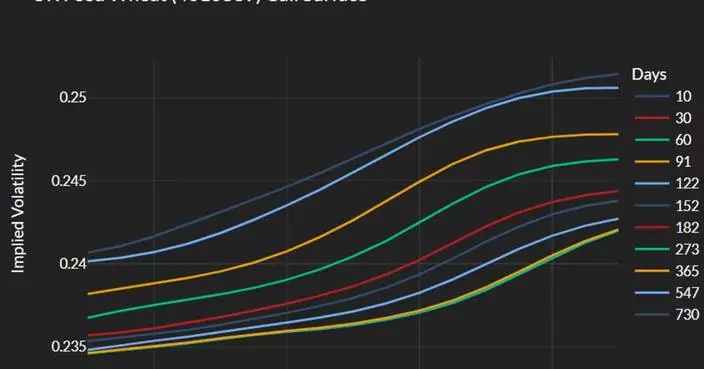TEHRAN, Iran (AP) — Iran has paused the process of implementing a new, stricter law on women’s mandatory headscarf, or hijab, an official said — a bill that many believe could have reignited the protests that engulfed the Islamic Republic after the 2022 death of Mahsa Amini.
The controversial law, which was approved by the parliament in September 2023, will not be sent to the government as planned this week, according to one of the country's vice presidents. The development effectively means that Iran has halted enacting the legislation.
Click to Gallery
FILE Iranian women, some without wearing their mandatory Islamic headscarves, walk in downtown Tehran, Iran, Saturday, Sept. 9, 2023. (AP Photo/Vahid Salemi, File)
An Iranian woman, without wearing her mandatory Islamic headscarf, walks in northern Tehran, Iran, Friday, Nov. 15, 2024. (AP Photo/Vahid Salemi)
An Iranian woman, without wearing her mandatory Islamic headscarf, leaves a flower shop in port city of Bandar Anzali in northern Iran, Thursday, Dec. 5, 2024. (AP Photo/Vahid Salemi)
A shopkeeper puts on a woman's clothes on a mannequin at a shop in port city of Bandar Anzali in northern Iran, Thursday, Dec. 5, 2024. (AP Photo/Vahid Salemi)
An Iranian woman, without wearing her mandatory Islamic headscarf, walks in northern Tehran, Iran, Friday, Nov. 15, 2024. (AP Photo/Vahid Salemi)
An Iranian woman, without wearing her mandatory Islamic headscarf, leaves a flower shop in port city of Bandar Anzali in northern Iran, Thursday, Dec. 5, 2024. (AP Photo/Vahid Salemi)
An Iranian woman walks in port city of Bandar Anzali in northern Iran, Thursday, Dec. 5, 2024. (AP Photo/Vahid Salemi)
A woman selects clothes as her husband looks on at a shop in port city of Bandar Anzali in northern Iran, Thursday, Dec. 5, 2024. (AP Photo/Vahid Salemi)
Iranian women, without wearing their mandatory Islamic headscarves, share a laugh while walking in northern Tehran, Iran, Friday, Nov. 15, 2024. (AP Photo/Vahid Salemi)
Iranian women, without wearing their mandatory Islamic headscarves, walk in northern Tehran, Iran, Friday, Nov. 15, 2024. (AP Photo/Vahid Salemi)
The law levies harsher punishments for women who refuse to wear the hijab and for businesses that serve them, penalties previously rejected by Iran’s reformist President Masoud Pezeshkian as he tries to restart talks with the West over sanctions imposed on Iran over its nuclear program.
“According to the discussions held, it was decided that this law will not be referred to the government by the parliament for now,” Shahram Dabiri, the vice president in charge of parliamentary affairs, was quoted as saying in an interview Monday with the pro-reform Ham Mihan daily.
The decision to halt the legislation — at least temporarily — was reached by top executive, legislative and judiciary bodies, Dabiri also said.
At the moment, it is “not feasible to implement this bill,” he added, without elaborating.
Had the bill passed to the government, Iran's president would have had little room to maneuver. By law, he’s required to endorse the bill within five days, after which it would have taken effect in 15 days. The president has no authority to veto it.
Pezeshkian could try to convince Iran’s 85-year-old Supreme Leader Ayatollah Ali Khamenei, who has final say on all matters of state, to halt the bill.
If the bill had been enacted, Pezeshkian could also refuse to act on it or urge police not to enforce it, setting up a potential constitutional crisis that hard-liners could try to exploit to weaken him.
The president had earlier described the law as having “many questions and ambiguities.”
Amini died on Sept. 16, 2022, after her arrest by the country’s morality police over allegedly not wearing her hijab to the liking of the authorities.
Iran has denied being responsible for her death and disputes she was beaten. However, United Nations investigators have concluded Amini ”was subjected to physical violence that led to her death,” which they blamed on the morality police.
The monthslong security crackdown that followed Amini’s death killed more than 500 people and saw over 22,000 detained.
In the years since, Iranian women on the streets increasingly have ignored the existing hijab law, walking in public with their hair uncovered despite the threat of arrest or harassment.
The new, 74-section law envisages fines of $800 for first offenses and $1,500 for second offenses, followed by prison terms of up to 15 years for third offenses. Also, celebrities and public figures could see the confiscation of 8% of their net worth, while businesses face the possibility of closure and fines for serving those not wearing a headscarf. Travel bans also would have been enacted for offenders.
The law also would have allowed foreign nationals, including the millions of Afghans living in Iran, to work as informers reporting women not wearing the hijab. Business owners and taxi drivers would be encouraged to report on uncovered women. Otherwise, they can face cash fines.
The scope of the law, which would be in place for three years, is extraordinary even for the Islamic Republic. It also includes allowing police access to private surveillance footage and even footage recorded by security forces, the Defense Ministry and the country’s civilian nuclear agency.
Associated Press writer Jon Gambrell in Dubai, United Arab Emirates, contributed to this report.
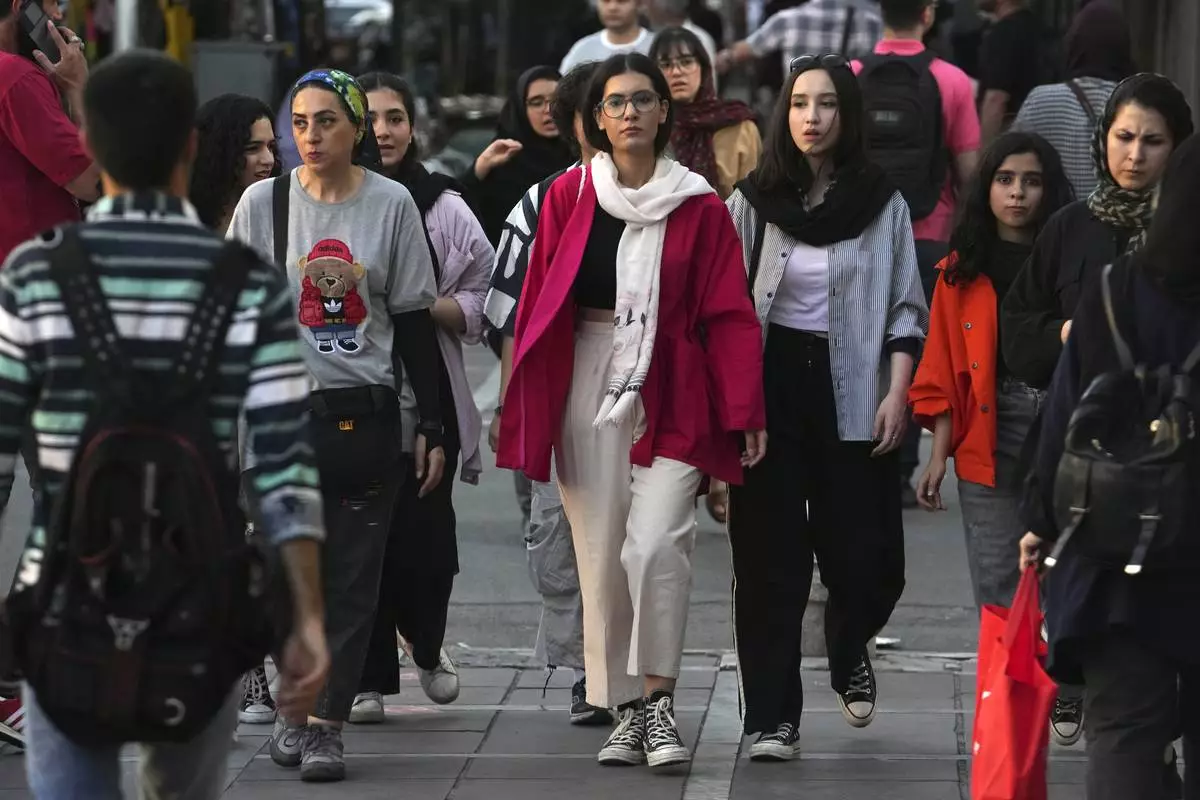
FILE Iranian women, some without wearing their mandatory Islamic headscarves, walk in downtown Tehran, Iran, Saturday, Sept. 9, 2023. (AP Photo/Vahid Salemi, File)

An Iranian woman, without wearing her mandatory Islamic headscarf, walks in northern Tehran, Iran, Friday, Nov. 15, 2024. (AP Photo/Vahid Salemi)

An Iranian woman, without wearing her mandatory Islamic headscarf, leaves a flower shop in port city of Bandar Anzali in northern Iran, Thursday, Dec. 5, 2024. (AP Photo/Vahid Salemi)
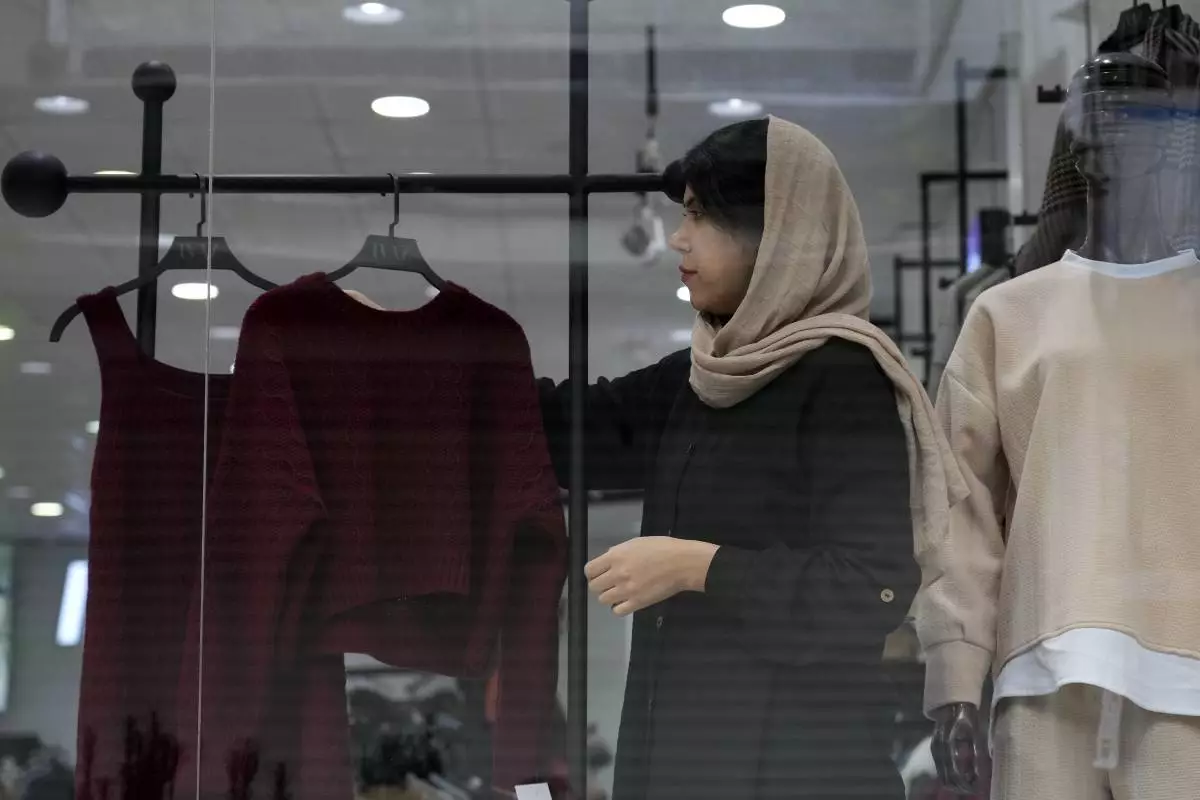
A shopkeeper puts on a woman's clothes on a mannequin at a shop in port city of Bandar Anzali in northern Iran, Thursday, Dec. 5, 2024. (AP Photo/Vahid Salemi)

An Iranian woman, without wearing her mandatory Islamic headscarf, walks in northern Tehran, Iran, Friday, Nov. 15, 2024. (AP Photo/Vahid Salemi)

An Iranian woman, without wearing her mandatory Islamic headscarf, leaves a flower shop in port city of Bandar Anzali in northern Iran, Thursday, Dec. 5, 2024. (AP Photo/Vahid Salemi)
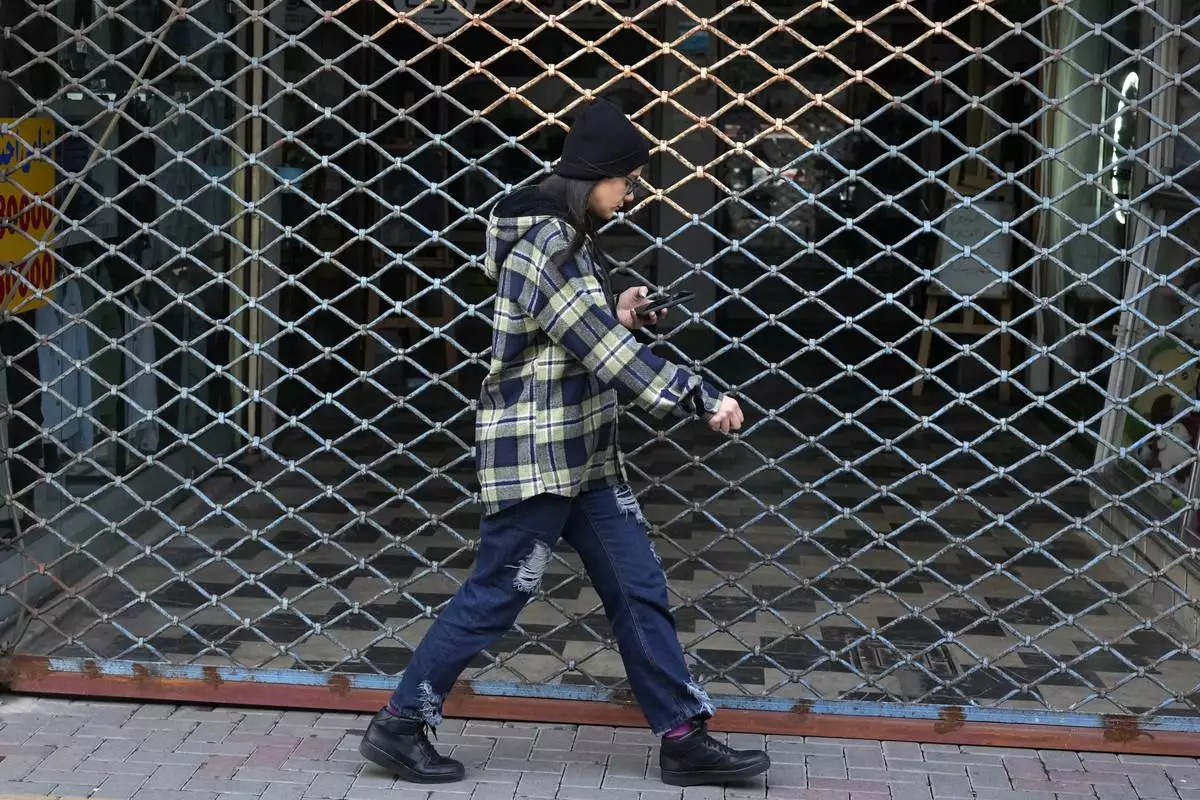
An Iranian woman walks in port city of Bandar Anzali in northern Iran, Thursday, Dec. 5, 2024. (AP Photo/Vahid Salemi)
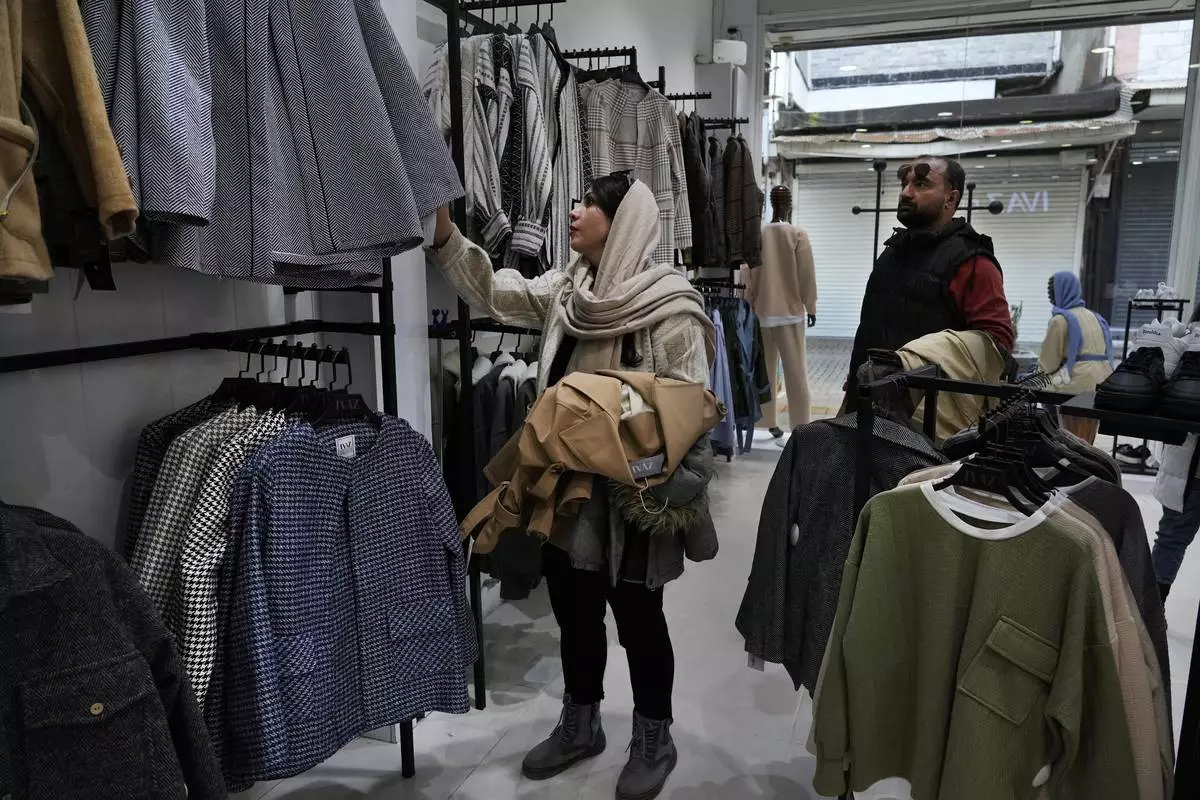
A woman selects clothes as her husband looks on at a shop in port city of Bandar Anzali in northern Iran, Thursday, Dec. 5, 2024. (AP Photo/Vahid Salemi)

Iranian women, without wearing their mandatory Islamic headscarves, share a laugh while walking in northern Tehran, Iran, Friday, Nov. 15, 2024. (AP Photo/Vahid Salemi)

Iranian women, without wearing their mandatory Islamic headscarves, walk in northern Tehran, Iran, Friday, Nov. 15, 2024. (AP Photo/Vahid Salemi)
TORONTO (AP) — The premier of Canada's most populous province said Tuesday President-elect Donald Trump's plan to impose sweeping 25% tariffs on all Canadian products would be a "disaster" that would hurt U.S. stock markets.
Ontario Premier Doug Ford also said in an interview with The Associated Press that he's “extremely worried” about Trump's plan to launch a mass deportation of millions of undocumented people. Ford said he has a plan to send hundreds of police officers to the border if they come north.
Ford said tariffs won't work considering how integrated the U.S. and Canadian economies are. He noted that in the auto sector alone parts and go back and forth between Canada-U.S. border seven or eight times before being assembled in Ontario or Michigan.
“It is so integrated. I don't even know how you separate that in the supply chain. It would be a disaster,” Ford told the AP. “It will affect the market. The market will drop and we have every CEO saying that is not the way to go."
Ford said the market consequences will get Trump's attention.
“I know he has many scorecards, but one is the stock market,” he said.
Trump responded early Wednesday by trolling Canada again.
“No one can answer why we subsidize Canada to the tune of over $100,000,000 a year? Makes no sense!," Trump posted on Truth Social. ”Many Canadians want Canada to become the 51st State. They would save massively on taxes and military protection. I think it is a great idea. 51st State!!!”
Trump often brought up the 51st state line to Canadian Prime Minister Justin Trudeau during Trump’s first term in office and has gone public with it in recent weeks.
Canada’s ambassador to Washington, Kirsten Hillman, has said the U.S. had a $75 billion trade deficit with Canada last year. But she noted a third of what Canada sells into the U.S. are energy exports and prices have been high.
About 60% of U.S. crude oil imports and 85% of U.S. electricity imports are from Canada.
Hillman said trade balances are something that Trump focuses on so it’s important to put it into context.
“We are one-tenth the size of the United States so a balanced trade deal would mean per capita we are buying 10 times more from the U.S. than they are buying from us. If that’s his metric we will certainly engage on that," Hillman told The AP.
Ford said he's also very worried about Trump's plans to create “the largest mass deportation program in history."
“I am extremely concerned," Ford said. “We do have a plan ready. We have hundreds of provincial police officers that are ready within hours, if not immediately, to hit the borders.”
Ford said a combination of local police, provincial police and the federal government will all be working together. “We’ll make sure that we tighten up that border like we’ve never seen before," he said.
Trump has threatened to impose 25% tariffs on all Canadian goods if Canada and Mexico do not stem the flow of migrants and fentanyl from entering the U.S. border — even though far fewer of each crosses into the U.S. from Canada than from Mexico.
Ford made the comments shortly after Canada's federal government announced more details about a billion-dollar border plan that's designed to avert the tariffs. Canada's national police plans to create a new aerial intelligence task force to provide round-the-clock surveillance of Canada’s border using helicopters, drones and surveillance towers.
Canada will also propose to the United States the creation of a North American “joint strike force” to target organized crime groups that work across borders.
Public Safety Minister Dominic LeBlanc said he has discussed parts of the plan with American officials and that he is optimistic about its reception.
“We have a lot of work ahead of us,” said LeBlanc, who tried to play down the notion Canada was simply bowing to American demands.
Ford reiterated he would restrict electricity exports to Michigan, New York and Minnesota if the sweeping tariffs are imposed.
“I want to sell them more energy, more critical minerals, but I’m going to always keep every tool in our tool box available” Ford said. “We have the energy. They need the energy.”
Canada is also the largest foreign supplier of steel, aluminum and uranium to the U.S. and has 34 critical minerals and metals that the Pentagon is eager for.
Nearly $3.6 billion Canadian dollars ($2.7 billion) worth of goods and services cross the border each day. Canada is the top export destination for 36 U.S. states.
“We want to sit down and explain to Trump and inform him that we aren’t the enemy," Ford said. “And as for Mexico I want to do a bilateral trade deal directly with the U.S.”
Flows of migrants and seizures of drugs at the two countries’ border are vastly different. U.S. customs agents seized 43 pounds of fentanyl at the Canadian border during the last fiscal year, compared with 21,100 pounds at the Mexican border.
Most of the fentanyl reaching the U.S. — where it causes about 70,000 overdose deaths annually — is made by Mexican drug cartels using precursor chemicals smuggled from Asia.
On immigration, the U.S. Border Patrol reported 1.53 million encounters with migrants at the southwest border with Mexico between October 2023 and September 2024. That compares to 23,721 encounters at the Canadian border during that time.

Ontario Premier Doug Ford attends a news conference at Queen's Park Legislature in Toronto on Thursday December 12, 2024. THE CANADIAN PRESS/Chris Young/The Canadian Press via AP)



























